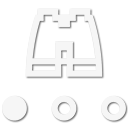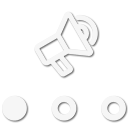
Member III
Now Lars has a good Boot Camp article with a good overview of ham radio and some info on radios. He does make mention of how to get licensed however I had this article written and thought I would share it here as it may give a little more insight into getting licensed specifically.
Ham radio, it's not just your Grandfather's hobby any more. It is a viable tool for the off road community for trail/convoy comms as well as a safety line, but it does require a license from the FCC.
Where do I start:
First I would find a local club that is either giving a class/test or at least a test.
If they give a class there is usually a test given at the end of that class. They may offer a one day ham cram session or may spread it out to one night a week for 6-8 weeks.
To find a local club you can check the ARRL website (Home) or a google search for your city and "amateur radio club/society".
Due to the current (2020) pandemic some clubs have stepped up and are offering remote testing via apps such as Zoom. A good place to find available remote test sessions is www.hamstudy.org/sessions.
You must first take the Technician test, even if you are wanting to get your General class license. And you must take the Tech and General to get your Extra. So study and become proficient in the Technician material before moving on to the General study material. Each level of license allows access to more frequencies, for average off roading a Technician license with a 2 meter radio would likely suffice however if you plan on getting into long really off the beaten path adventures a General class license may be worth looking into as it allows must longer distance communication.
Ok, but what do I have to know:
There are many study guide books available such as; The ARRL Ham License study guide, Ham Radio for Dummies, Study guides by Gordon West as well as many others. http://www.amazon.com/s/ref=nb_sb_no...o+study+guides
I prefer FREE material and used the study guides from No-Nonsense Study Guides - KB6NU's Ham Radio Blog .
There are study and practice test web sites: www.hamstudy.org, www.QRZ.com, www.Eham.net, www.hamexam.org, and others. Some require a free log in to keep track of your previous scores.
There are also podcasts/videocast that cover the material as well. Ham College , Ham Radio Crash Course and others.
Many of the study/practice test websites have flash cards to study, they give you the question and the right answer. If study guides aren't your thing I would recommend this method as opposed to just taking practice test over and over again and go through the study material multiple times before taking the test. This way you only have the right answer in your head and it will jump out at you when you take the test, where as with the other way you already have ALL the answers in your head so they all look familiar.
You have to answer 26 out of 35 (74.2%) correct to pass for Tech and General and 37 out of 50 for Extra. Once you are in the 90%+ on your practice test you are ready to take the real test.
Taking the Test:
Arrive early and bring a copy of your driver's license, cash (typically $15 for the test) and a pen or pencil depending on the VE team giving the test. You may also bring an old school calculator but you can use the back or answer sheet to manually work the problems.
You passed the Test: (and you will!)
The VEs (Volunteer Examiners) will give you a CSCE (Certificate of Successful Completion of Examination). This indicates what level of test you have completed and will be needed if you decide to upgrade before your license posts to the FCC database.
But what about my callsign?:
About 7+/- business days from the date you took the test you can start checking the FCC ULS database for your call sign. You will want to search by last name, first name. The time it takes for this to happen varies depending on the VEs and the VEC. I have seen anywhere from 1 day to almost 14 days. Once your call sign appears here, you may begin using your radio and making contacts.
The FCC no longer mails hard copy license automatically but will email you a link to access an "official" copy to print off yourself. You can still request a hard copy to be mailed.
Hopefully this helps get you on your way to obtaining your license, but if you have any questions please feel free to ask.
Ham radio, it's not just your Grandfather's hobby any more. It is a viable tool for the off road community for trail/convoy comms as well as a safety line, but it does require a license from the FCC.
Where do I start:
First I would find a local club that is either giving a class/test or at least a test.
If they give a class there is usually a test given at the end of that class. They may offer a one day ham cram session or may spread it out to one night a week for 6-8 weeks.
To find a local club you can check the ARRL website (Home) or a google search for your city and "amateur radio club/society".
Due to the current (2020) pandemic some clubs have stepped up and are offering remote testing via apps such as Zoom. A good place to find available remote test sessions is www.hamstudy.org/sessions.
You must first take the Technician test, even if you are wanting to get your General class license. And you must take the Tech and General to get your Extra. So study and become proficient in the Technician material before moving on to the General study material. Each level of license allows access to more frequencies, for average off roading a Technician license with a 2 meter radio would likely suffice however if you plan on getting into long really off the beaten path adventures a General class license may be worth looking into as it allows must longer distance communication.
Ok, but what do I have to know:
There are many study guide books available such as; The ARRL Ham License study guide, Ham Radio for Dummies, Study guides by Gordon West as well as many others. http://www.amazon.com/s/ref=nb_sb_no...o+study+guides
I prefer FREE material and used the study guides from No-Nonsense Study Guides - KB6NU's Ham Radio Blog .
There are study and practice test web sites: www.hamstudy.org, www.QRZ.com, www.Eham.net, www.hamexam.org, and others. Some require a free log in to keep track of your previous scores.
There are also podcasts/videocast that cover the material as well. Ham College , Ham Radio Crash Course and others.
Many of the study/practice test websites have flash cards to study, they give you the question and the right answer. If study guides aren't your thing I would recommend this method as opposed to just taking practice test over and over again and go through the study material multiple times before taking the test. This way you only have the right answer in your head and it will jump out at you when you take the test, where as with the other way you already have ALL the answers in your head so they all look familiar.
You have to answer 26 out of 35 (74.2%) correct to pass for Tech and General and 37 out of 50 for Extra. Once you are in the 90%+ on your practice test you are ready to take the real test.
Taking the Test:
Arrive early and bring a copy of your driver's license, cash (typically $15 for the test) and a pen or pencil depending on the VE team giving the test. You may also bring an old school calculator but you can use the back or answer sheet to manually work the problems.
You passed the Test: (and you will!)
The VEs (Volunteer Examiners) will give you a CSCE (Certificate of Successful Completion of Examination). This indicates what level of test you have completed and will be needed if you decide to upgrade before your license posts to the FCC database.
But what about my callsign?:
About 7+/- business days from the date you took the test you can start checking the FCC ULS database for your call sign. You will want to search by last name, first name. The time it takes for this to happen varies depending on the VEs and the VEC. I have seen anywhere from 1 day to almost 14 days. Once your call sign appears here, you may begin using your radio and making contacts.
The FCC no longer mails hard copy license automatically but will email you a link to access an "official" copy to print off yourself. You can still request a hard copy to be mailed.
Hopefully this helps get you on your way to obtaining your license, but if you have any questions please feel free to ask.
Last edited:



